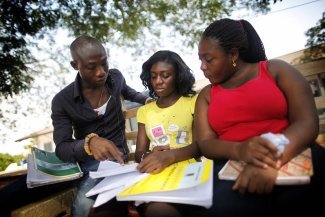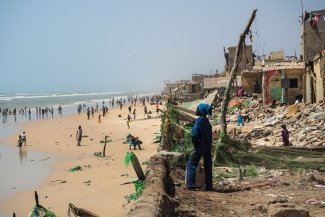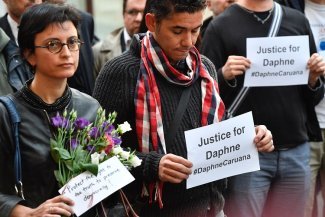The visa discrimination and travel restrictions faced by African journalists and other travellers journeying internationally is well-documented, but these issues also exist when travelling across the African continent. In this August 2020 photo, passengers queue at check-in desks at the Jomo Kenyatta International Airport in Nairobi, Kenya.
In mid-August, Cameroonian journalist Sainclair Mezing, who works for the state-owned national bilingual daily Cameroon Tribune, was set to cover the general elections in next-door Gabon. Armed with a pen, notepad and laptop, Mezing was airborne on 19 August, en-route to the Gabonese capital Libreville to cover the voting in the presidential, legislative and local polls.
But after the aircraft taxied at Léon-Mba International Airport in Libreville, Mezing didn’t get any further than immigration. He was arrested by police officers, interrogated, briefly detained, and then repatriated.
“My sin was that I did not have accreditation to cover the general elections in Gabon. Gabonese embassy officials here [in Yaounde] told me that I no longer needed a visa because of the agreement on the free movement of people within the CEMAC (Economic and Monetary Community of Central Africa) zone and that I could get accreditation on the spot. Even Gabonese colleagues reassured me that once I was in Libreville, I could obtain the document from the Ministry of Communication on the basis of my assignment letter. Unfortunately, as soon as I arrived at the airport, I was subjected to a tough interrogation,” says Mezing.
The dejected journalist tells Equal Times that he was confronted by officers who didn’t want to listen. “They even refused to let me have any contact with the Gabonese colleagues who had come to pick me up.”
At this point, Mezing knew his chances of covering the election, which were unsurprisingly contentious, were all squashed. He was bundled manu militari back to the waiting aircraft before his passport and travel documents, which had been confiscated, were returned. He was then flown back to Cameroon.
Mezing’s case is not an isolated one amongst journalists from the Global South, particularly Africans, who are not uncommonly denied access at ports of entry.
The visa discrimination and travel restrictions faced by African journalists, NGO workers, academics and creatives travelling to Europe or the Americas is well-documented. A recent piece in the Irish Times about the struggles that African journalists attempting to attend this year’s Global Investigative Journalism Conference noted: “For Africans – no matter their qualifications – visa applications can be extremely onerous and time-consuming, and the process humiliating. Applicants describe being treated with disdain and suspicion, charged unfair fees and made to produce overly specific documentation. And rejections often happen for no clear reason.”
However, African journalists can also face similar issues when travelling across the continent. Last July, Nigerian investigative journalist David Hundeyin faced a humiliating expulsion from Zimbabwe on claims that he did not meet certain immigration requirements. Hundeyin had barely landed in Harare before he was detained at the airport and processed for expulsion.
“They said that despite using the travel document of a country with a visa-free relationship, my nationality is still Nigerian, and thus, I need a visa,” Hundeyin tweeted, adding that he was locked up in a tiny, smelly room and the officers apparently forgot that he was detained there.
Not a level playing field
While some journalists have been denied entry at their destination, many others do not even manage to navigate the often-arduous visa procedures.
In 2018, Halima Athumani, a freelance journalist based in Uganda, was working with an investigative team and had planned to meet with one of the team members in South Africa, on the sidelines of the annual African Investigative Journalism Conference hosted by Wits University, Johannesburg. Athumani had everything paid for – her airline ticket, hotel booking, ground transportation, conference fee and other costs. So, she went to the South African visa application centre with high hopes – that her visa would be approved and that she would be able to meet with her Swiss colleague who was already in Johannesburg.
At the time, Athumani had gone for two months without receiving payment for her freelance work. The only money she had in her bank account was US$600, and the sum was seemingly insufficient for officials to accord her a short-stay visa. After a two-week wait, Athumani was told that her visa had been denied.
“They probably thought I was going to stay there,” Athumani says, and regrets the point-blank refusal despite the concrete explanation and presentation of affidavit of support, a return flight ticket, a hotel booking and an invitation letter from Wits, amongst other supporting documents.
Although Athumani eventually met her colleague elsewhere, she was never able to attend the conference. “It was a come-together of so many investigative journalists. It was such a big, missed opportunity,” Athumani tells Equal Times.
Many African journalists can relate to the feeling of missing important opportunities due to international travel and visa restrictions. These barriers not only limit them from accessing diverse sources and reporting on international issues from their own perspective with depth and accuracy, but also frustrate cross-border investigations, networking opportunities and career advancement.
This June, during a webinar on addressing visa and travel challenges for journalists organised by the International Centre for Journalists’ (ICFJ) Pamela Howard Forum on Global Crisis Reporting, various African journalists discussed the challenges they face with regards to international travel and described the phenomenon as a major barrier to press freedom. Journalists of the Global South are disproportionately affected as compared to their peers on the other side of the hemisphere as they are exposed to obstacles such as discrimination based on their nationality, stringent visa requirements, lengthy application procedures, prohibitive costs, a lack of respect during their interactions with immigration and embassy officials and excessive migration controls.
During the seminar, Kehinde Adegboyega, team lead at the Human Rights Journalists Network in Nigeria said of the visa discrimination faced by African journalists: “It is a major problem because journalists […]perform a major role in advancing democracy globally, locally. You need free access so that you are able to move everywhere as easy as possible.” He continued: “It’s very discouraging, especially when countries are looking at issues around democracy. And beyond our work as journalists, even as citizens…how do we improve migration rights? Every citizen [in Africa] faces this kind of challenge.”
“Why should two people doing the same job be treated differently?”
Anthony Bellanger, general secretary of the International Federation of Journalists (IFJ) says it is indeed a real concern and a clear injustice. “Why should two persons doing the same profession be treated differently and not enjoy the same rights? Access to Schengen visas, for example, can take weeks for colleagues in the South, if they are delivered at all. Criteria for obtaining these visas are very strict,” he tells Equal Times.
According to Kennedy Wandera, chairperson of the Foreign Press Association Africa (FPAA), some countries often practice visa discrimination against African travellers by requesting a complex list of documents, some of which can be very difficult to access, thus making it difficult for journalists to go and cover international events. “I think this is deliberate to target certain levels of journalists who are critical of certain governments in their reporting,” Wandera says.
Under the Universal Declaration of Human Rights, which marks its 75th anniversary this December, journalists benefit from the right to freely move across borders (Article 13) and the right to freedom of expression (Article 19). That is in principle. In practice, African journalists and reporters from other countries in the Global South can’t move freely when and to where they want for work-related purposes. They have to fulfil sets of arbitrary conditions for each country which seem to be designed to discourage applicants from travelling, and they get profiled in foreign airports depending on which passport they hold.
For instance, a journalist in the Global North holding a Finnish passport, ranked second in the world, according to the Henley Passport Index 2023 Global Ranking, has visa-free access to 190 countries, whereas his or her Nigerian colleague, with a passport in joint 96th position towards the bottom of the Index, can only travel visa-free to 44 countries.
To put this into context, the Finnish journalist will have an edge over their Nigerian colleague if both of them are separately investigating a cross-border story on drug trafficking along the US-Mexico border. It will be much easier for the Finnish journalist to travel to the US, and then to Mexico – which will allow them to write a story with much more detail and colour. Under such circumstances, in the event of a reporting award, the Finnish journalist is more likely to win.
Though there is no definitive data on the state of visa discrimination, a UK parliamentary group report gives an idea of the scale and extent of how African travellers are treated. The report shows that African visa applicants to Britain, including journalists, were denied visas at more than double the rejection rate of the rest of the world.
To clear these barriers, Wandera of the FPAA says governments should be willing to make it easy for journalists traveling for international events. “Clearance letters or letters of endorsement from their stations of duty should be sufficient enough to allow journalists to be cleared for visa processing. Legal requirements should not be used to deny or reject journalists visas,” Wandera insists.
On his part, Bellanger suggests that holding an international press card delivered by the IFJ, which is recognised by the International Committee of the Red Cross, the United Nations, and in 146 countries, can help.
Bellanger is also calling for more countries to adhere to their international commitments to protect press freedom: “Certain countries of origin do not let journalists leave the country easily. So, there should be efforts there. But more importantly, states should adopt clear protocols that ease journalists’ travels. Most countries have ratified international conventions that call for the protection of press freedom and freedom of expression. [As a result], it does not make sense to have restrictions on visa delivery; it contradicts their international commitments,” he says.













